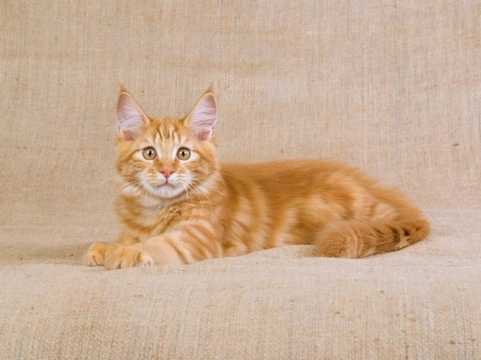
Some frequently asked questions about the Maine Coon cat breed
The Maine Coon is also sometimes referred to as the American Longhair cat, and is native to the American state of Maine, and is in fact the state’s official cat! They are very popular across North America and are one of the nation’s oldest native cat breeds, and are also popular in many other countries, including the UK. They are large in build, very hardy and more than capable of weathering cold winters, and have a long, thick coat. They can be found in various different colours, and are renowned for their bold, inquisitive natures and kind temperaments, making them excellent cats as all round pets for people from all walks of life.
The Maine Coon reliably makes the top five list of pedigree cat breeds in the USA, and they are also commonly found in our top ten list here in the UK, making them one of the most widely seen pedigree cat breeds here in Britain. If you are wondering if a Maine Coon is the right cat breed for you and wish to find out more about them, in this article we will cover some of the most frequently asked questions about the breed as a whole. Read on to learn more.
What are their personalities like?
The Maine Coon is known as a gentle giant, and they are ranked as of above average intelligence compared to most other cat breeds. They are independent and love to spend time out of doors, meaning that they do not need constant companionship and supervision, but they are loyal and loving with their families and are good company for people of all ages. They maintain playful natures well into old age, and like to explore and have things to do!
They are also fairly vocal and have a range of different meows and sounds at their disposal, and will often hold conversations with their owners that answer them back!
How large do they grow to be?
The Maine Coon breed is one of the largest domestic cats, and they can grow fairly large! Males can weigh up to 25lb and females up to 15lb, making the Maine Coon a large, solid and long cat that will easily take up half a sofa on their own if permitted to do so!
Do they get on with other animals?
The Maine Coon is relatively calm and speculative, and this makes them amenable to potentially sharing their home with other cats or dogs, providing that introductions and socialisation are carefully managed.
Do their coats require a lot of maintenance?
All longhaired cats require some brushing and grooming, but precisely how much will depend on the individual cat. It is wise to get the Maine Coon used to being groomed when they are young, and brush them daily if possible. They can be prone to getting knotted or matted up, particularly under their bellies and around the legs, particularly if they go outdoors a lot and like to explore the undergrowth!
Do they need bathing?
While some Maine Coon owners do bathe their cats once or twice per year as a matter of course, the Maine Coon does not need bathing per se. However, the breed as a whole is often associated with a love of water, and some cats of the breed will actually paddle or swim in ponds, or have a certain fascination with running water from taps, and so sometimes they actively enjoy being bathed.
Are Maine Coons polydactyl?
The trait of polydactyly means having extra digits, such as additional toes on one or more of the paws. The Maine Coon breed did formerly used to produce a significant number of polydactyl cats when left to breed naturally, but as polydactyly is considered to be a disqualifying fault when showing, the trait has almost entirely been bred out of the breed. However, it is entirely possible to see a Maine Coon with polydactyly, which is a simple genetic anomaly that poses no problem to cats possessed of the trait.
If you wish to show your cat, count their toes- but otherwise, do not worry!
Are they healthy?
The average longevity of the Maine Coon is 12.5 years, and they are relatively long lived for a pure breed cat, with a significant number of them reaching ages of over fifteen. However, the breed is prone to certain hereditary health conditions, which can affect the longevity of individual cats.
One of the most commonly found hereditary health conditions within the Maine Coon gene pool is feline hypertrophic cardiomyopathy, which is the most commonly occurring heart condition across cats of all breeds. Genetic testing for the presence of this anomaly is possible, and professional breeders sometimes test their breeding lines when selecting their parent cats.
Spinal muscular atrophy, hip dysplasia and polycystic kidney disease are other conditions that have slightly elevated occurrence rates within the Maine Coon gene pool too.



